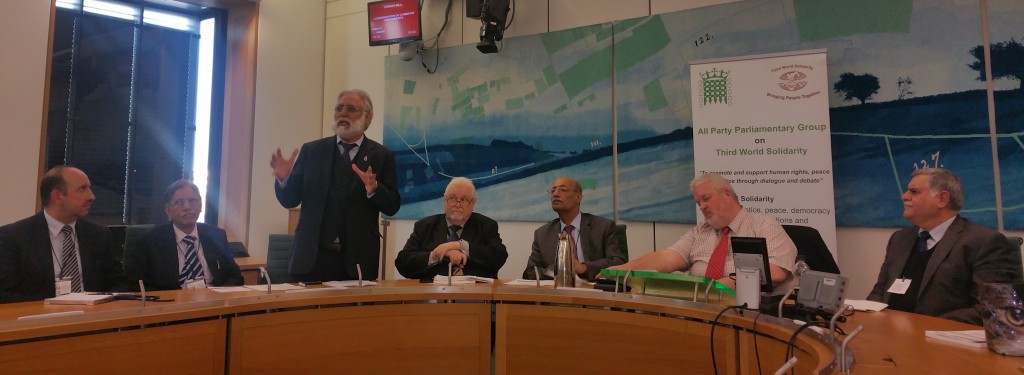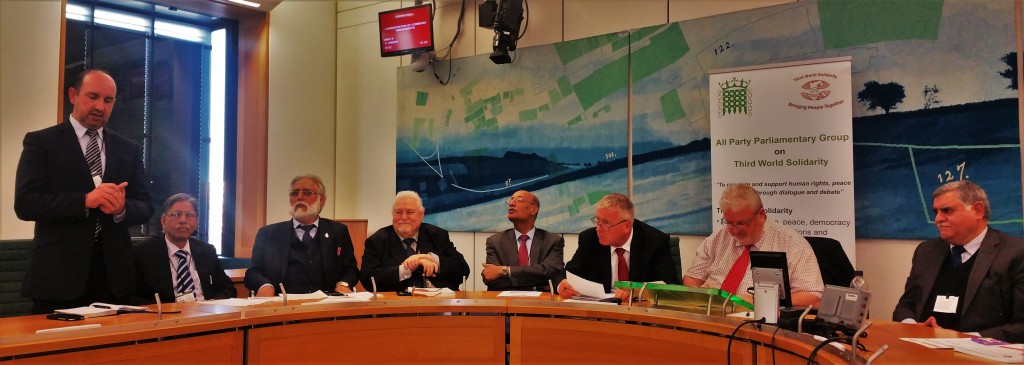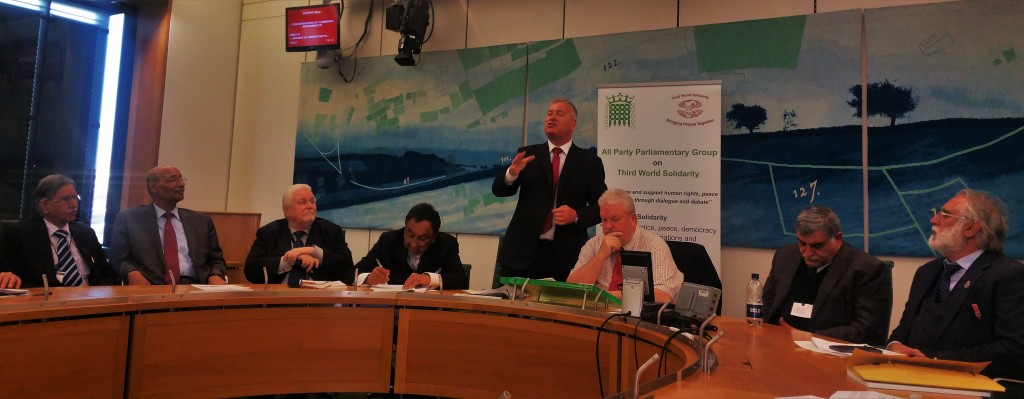Speakers concluded that Iraq was in need of support from international allies to tackle extremism at the Third World Solidarity organised seminar titled “Update on Iraq Situation” at Portcullis House, House of Commons on Tuesday 12th April. The session was chaired by Dave Anderson MP and speakers included Ian Lavery MP (Shadow Minister for Trade Union), Ann Clwyd MP (Chair, APPG on Iraq), Toaha Qureshi MBE (Chairman, Forum for International Relations Development), Nazar Mirjan (Political Affairs, Embassy of the Republic of Iraq, London), Hashim Alhashimi (Iraqi Democratic Movement-UK), Ms. Saundar Satterlee (TWS) and Vijay Mehta, (Uniting for Peace).

Beginning the session, Dave Anderson MP invited Toaha Qureshi MBE to address the audience. He stated that the invasion of Iraq had taken place and there was no changing history – but it was important to accept and understand that the basis for the war was a sexed up dossier. It was a good step that the Deputy British Prime Minister Nick Clegg MP accepted that the war in Iraq was illegal. However, the consequences of the war were very problematic for people both in Iraq and across the globe. He said that the western powers, US and UK, had lost their moral standing after this blunder. People have been caught up in this political mess, in particular Christians, who have now been forcibly removed from a country where they had been for 1600 years due to the terrorist menace Daesh. He suggested various solutions to Iraq, including increasing British aid to Iraq, international allies supporting the country on countering terrorism/extremism and strategising infrastructural development.
Nazar Mirjan stressed that the democracy in Iraq was still young and needed time to mature and develop. Having seen democracy in other countries such as Korea, there were still problems despite having over a century and a half to develop. Despite there being problems, he said that it was good that elections had been taking place. Awareness of elections amongst the public was needed and they have to gain an understanding of who to vote for. He welcomed suggestions by Mr Qureshi, saying that international support to defeat terrorism was essential to ensure security. His position was clear; rather than trying to score political points, all parties should come together to support democracy.

Ann Clwyd MP said that hundreds of thousands of people had been displaced by the war and its consequent events. It was unfortunate that the UK had been selling arms to Saddam Hussein in the past. With the current situation of Iraq being the way it is, she hoped to visit once again. She urged the Iraqi government and people to ask the British MP’s what they needed, so that they could question the government and bring it to their notice.
Ian Lavery MP spoke from the working class point of view, claiming that they have poor representation in the political process. They need respect and protection as well as integrity. The ordinary people are in need of a voice which the government must echo. Speaking of the beginning of the labour party, he urged the Iraqi people to help wherever they can because it was ordinary people that created the party 150 years ago.

Saundra Satterlee made bold claims stating that ISIS had been incubated through the US imprisonment of Iraqis. Despite vilification by the West, she spoke of the good work carried out by Saddam Hussein, seen first hand during her visit to Iraq. The sanctions placed on Iraq prevented the rebuilding of the country in terms of transport, construction, clean water etc. She said that she walked around in Iraq freely, witnessing gender equality and being free of fear.
Hashim Alhashmi gave an insight into the feelings of the people of Iraq when the invasion first started. He said that people watched in fear and hope during the war. Fear because they mistrusted foreign powers, viewed as invaders, and hope because of democratic change. Unfortunately, their hopes were dashed and their fears proven – the war of 2003 was a lost opportunity. He said that proxy wars were being waged by exploiting ethnicity and religion, creating sectarian divisions. He ended by saying that a government needs to be created without considering sectarian alliances and separation of powers was imperative for accountability.
![[X] Close](http://www.fird.org.uk/wp-content/themes/fird/images/close.png)





